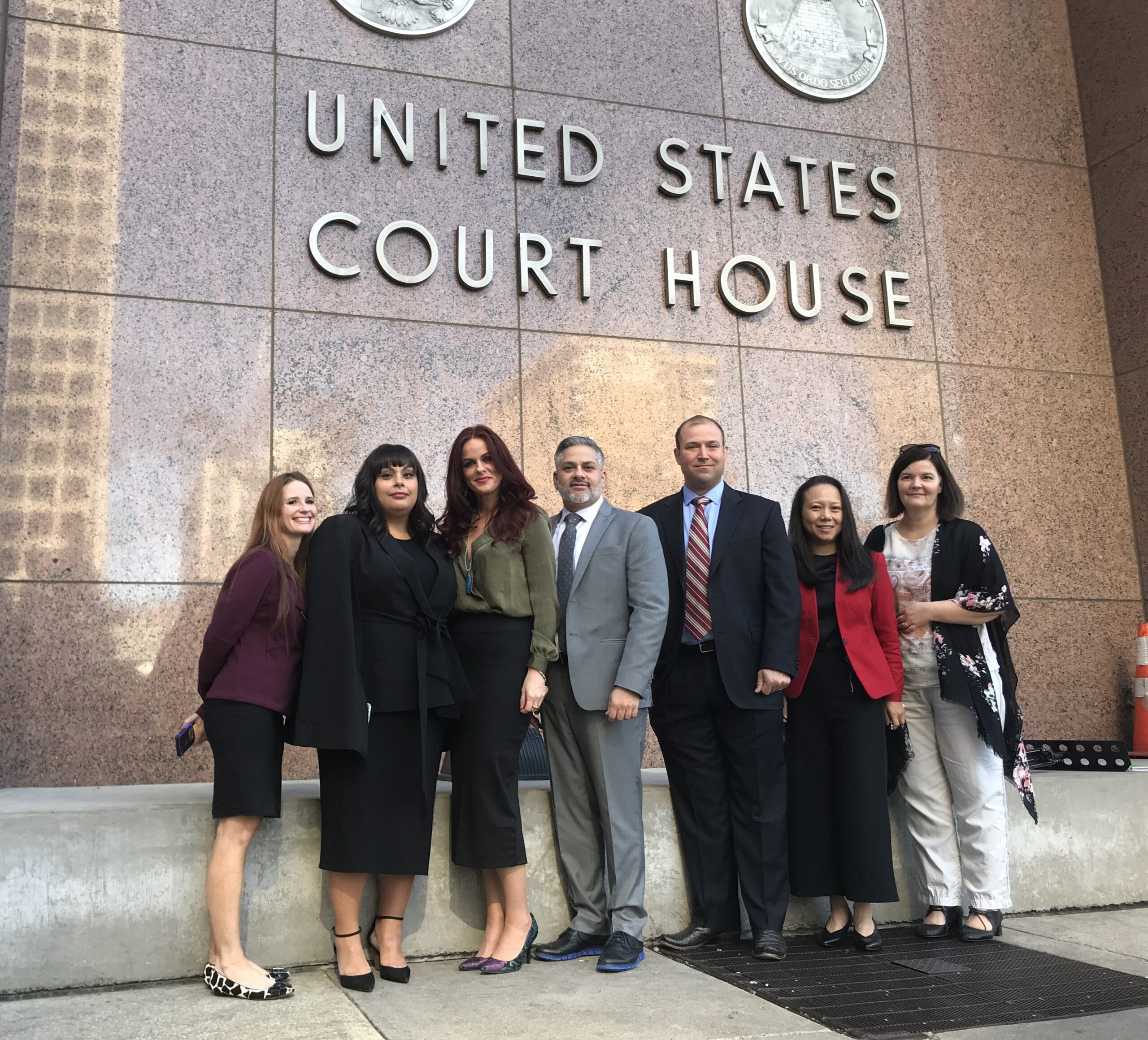 {Read in 2:30 minutes} The New York City Fire Department is filled with extremely brave men and women, some out in the field and many behind the scenes. While there is certainly a long and illustrious history of dedication and incredible courage, unfortunately over the years there have also been repeated allegations of racial discrimination. As recently as 2014, the city agreed to pay $98 million to settle what is known as the “Vulcan” case to address allegations of racial bias against New York City Firefighters. Now, in a federal lawsuit, our firm, Valli Kane & Vagnini LLP and Washington D.C. based Mehri & Skalet filed on behalf of civilian workers of the FDNY and a federal judge ruled that the case can move forward.Continue reading
{Read in 2:30 minutes} The New York City Fire Department is filled with extremely brave men and women, some out in the field and many behind the scenes. While there is certainly a long and illustrious history of dedication and incredible courage, unfortunately over the years there have also been repeated allegations of racial discrimination. As recently as 2014, the city agreed to pay $98 million to settle what is known as the “Vulcan” case to address allegations of racial bias against New York City Firefighters. Now, in a federal lawsuit, our firm, Valli Kane & Vagnini LLP and Washington D.C. based Mehri & Skalet filed on behalf of civilian workers of the FDNY and a federal judge ruled that the case can move forward.Continue reading
New York State’s Sweeping Anti-Sexual Harassment Legislation
 {Read in 4 minutes} In response to the #MeToo Movement, New York State and New York City overhauled their sexual harassment policies to give women additional protection in the workplace.
{Read in 4 minutes} In response to the #MeToo Movement, New York State and New York City overhauled their sexual harassment policies to give women additional protection in the workplace.
- It is important that women know they now have additional rights that they did not have before.
- It is also important that employers know they now have additional responsibilities that they did not have before.
In April 2018, Governor Cuomo signed sweeping anti-sexual harassment legislation into law, which goes into effect October 9th and applies to all employers. The new law requires employers to adopt a prevention plan that not only prohibits sexual harassment but provides examples of unacceptable conduct. The policy has to include information about the federal and state laws, and a standard complaint form. Continue reading
Workplace Discrimination? Get that Complaint Filed!
Employees in this country have protections against workplace discrimination and harassment. These include protection from sexual or racial harassment, national origin, religion, age, disability, and gender (including sexual orientation) discrimination. These forms of harassment and discrimination are spelled out under Title VII, and its amendments, which is the statute enacted as a result of the Civil Rights Act of 1964.

Prior to that time, there had been other federal statutes such as §1981 and §1983 which address primarily race and national origin discrimination as well as retaliation. These sections, however, did not include gender, religion, disability, or age discrimination. As a result of the civil rights movement, the Civil Rights Act was passed, which was designed to specifically address workplace discrimination and expanded protections for employees subjected to these additional types of discrimination.
The Title VII statute empowered what is known as the Equal Employment Opportunity Commission (EEOC) and created that faction of the government whose job it is to survey and take complaints of workplace discrimination. Anyone wanting to bring a complaint and go into Federal court under those claims has to first go through the EEOC administrative process. As a federal statute, it is the same in every state and any employer who has 15 employees or more is subject to the statute.
The EEOC Filing Deadline
Title VII sets a complaint filing deadline of 180 calendar days. However, it also provides that in any state where there is a similar employment discrimination statute, such as New York, the deadline may be expanded to 300 days. With the exception of a few states like New Mexico and Georgia, every state in this country has a state-level statute against workplace discrimination. In those states that do not, the filing period is limited to the 180 days.
A complaint must be initiated when the harm takes place. You can’t have something happen two years earlier and then wait, worrying whether you are going to lose your job. That is certainly a legitimate worry, but if you choose to wait and try to raise that complaint after the 180-300 days have passed, it will be considered untimely because the statute requires you to make that complaint within 180-300 days of the occurrence of discrimination.
However, certain claims trigger the 180-300 day filing requirement after the last occurrence of discrimination where the discrimination takes place over a period of time. This type of discrimination is known as a “continuous violation.” For example, if you are a victim of sexual harassment and you were subjected to repeated, unwanted sexual advances or comments over a period of months, the clock starts running from the last act of harassment, not the first. Most employees do not know this.
If you believe you have a legitimate complaint, it is extremely important that you make use of resources like the EEOC’s website, or contact a lawyer like us to ask for information about what to do, even if you choose not to act on it at that time. Failing to act in many states leaves you high and dry, without any other protection, because either there is no state statute, or in more conservative jurisdictions like Texas, for example, the states only adopt the same 180-day rule as Title VII.
Paying attention to the EEOC deadlines is an important issue because an employee may have a very strong legal claim but if they do not act within a certain period of time, or get the information to act within a certain period of time, their claim may be completely barred leaving you with no avenue for justice.
James A. Vagnini
Partner
email: jvagnini@vkvlawyers.com
Supervisor sues Omni hotels, alleging sexual harassment and retaliation when she reported it
North Dakota workplace discrimination trial set for 2019
A racial discrimination lawsuit brought by six workers on a North Dakota job site is set for trial in late 2019. Continue reading
ABC, Marvel to Pay $1.75M to Settle TV, Movie Set Pay Claims
ABC Studios and Marvel Television Inc. will pay $1.75 million to settle claims it didn’t pay overtime to set workers, according to an agreement that received final court approval.
Continue reading
FDNY sued for discrimination — again
Nearly three years after the city agreed to pay $98 million to settle claims of bias in its hiring of black and Hispanic firefighters, New York’s Bravest is being sued for discrimination again.
Continue reading
Valeant Unit Settles Sex Discrimination Claims For $7.2M
Law360, Los Angeles (July 12, 2016, 4:56 PM EDT) — Valeant-owned Medicis Pharmaceutical Corp. will pay $7.2 million to settle a class action alleging gender discrimination and other claims brought by female sales representatives of the medical cosmetics company, according to a final settlement order signed by a D.C. federal judge Monday. Continue reading
Working Off The Clock? Think Again
With the American economy in the midst of its worst downturn in decades, corporations are trying to squeeze that last buck out of every corner they can. Job satisfaction is going down across the board. One largely unsung issue that may be elevating to epidemic proportions is “Off the Clock” work.
For many, going unpaid for the work you perform for your employer is illegal. Many corporations in the U.S. are, unfortunately, asking their workers to buck up and work without minimum wage or overtime pay. This violates both New York and Federal law. The plain fact of the matter is that the laws are designed to protect during the bad times as well as the good. Just because there is not as much money to go around does not mean that it is all right to ask workers to work off the clock without compensation.
Full Time Employees in New York
For the most part, New York State follows Federal guidelines when it comes to minimum wage and overtime. If a non-exempt employee is performing work of any sort for their employer, they are to be paid at least minimum wage for their work. If they are working over forty hours in a work week, then any time worked above that is eligible for overtime pay. Live in employees may claim overtime after forty-four hours as well. Naturally, standard exemptions apply to certain types of employees, including certain interships.
However, a controversial case is brewing in New York that might potentially change how the law sees interns nationwide. An intern is suing Harper’s Bazaar, claiming that minimum wage is due to all intern workers and that internships are exploitive. We will follow this case closely and continue to report on its significant role in the wage and hour litigation world.
Full Time Workers That Receive Tips
If your employer claims that you are not entitled to overtime pay because you receive tips in your line of work (such as a restaurant server, delivery driver, dancer, etc.), then your employer is out of compliance with New York and Federal law. All work performed by these types of workers are subject to minimum wage and overtime law.
If you are a non-exempt, hourly worker, an employer cannot refuse to pay you time working off the clock. You are entitled to be paid for all hours work at minimum wage or an overtime rate if over 40 hours in a work week. If you feel you are being forced to work “off the clock” meaning you are not being paid for your time, then you should contact an attorney familiar with these laws immediately. For a free consultation, contact the law offices of Valli Kane & Vagnini, LLP at (866) 441-2873. You need a talented lawyer that is not afraid to take on exploitive employers that disregard the law.
Wage Theft Prevention Act: Redundant Bureaucracy or Employer Protection?
No state in the Union has taken more steps to protect its workers and employees than the state of New York. However, critics say the state went too far with the Wage Theft Protection Act. This act caps off what some industry leaders—especially in construction—call an explosion of bureaucratic red tape that renders New York business unprofitable and untenable. The law’s proponents have commented that the new Wage Theft Protection Act may actually protect New York’s employers from horrific, small business-destroying lawsuits. Read on for the basics of the WTPA debate.
As of February 1, the act requires that workers be notified of their wages annually. The WTPA Pay Rate form must include how much the employee is paid and when, the name and address of the employer, and allowances. The new form must be provided in English, and the employee’s primary language, if applicable. New York’s Labor Department provides translations in Spanish, Chinese, Korean, Russian, Polish, and Haitian Creole. Failure to comply will result in fines up to $50 weekly.
Businesses have complained that the new paperwork burden will cost the state’s industry millions, and that the law will do little to curb shady work practices. The Wage Theft Protection Act is essentially, say critics, bureaucracy without function. However, the law may provide advantages to employers. For example, the WTPA may prevent lawsuits from employees that sue over pay disputes. As paperwork is a key component in all legal proceedings, this paperwork functions to protect employers in the event a dispute over pay turns into litigation.
Only time will tell if the WTPA changes the way New York does business for the better. America’s economic turmoil has been felt deeply in New York State. Entrepreneurs most often call for deregulation, citing that decreased laws and streamlined businesses will turn NY’s economy around. However, most would agree that employees need protection as well, and the WTPA’s goal is to provide that.
As the Wage Theft Protection Act forces your employers into documenting information relating to your wages, you may become aware that your employer has not been paying you properly or depriving you of certain rights relating to your pay. If you are involved in a wage dispute in New York, then you may benefit by speaking to an employment lawyer. An expert employment attorney can help you understand the complexities of New York workplace law as it relates to you and will vigorously fight for your right to fair pay. Do not let yourself be victimized. Call the law offices of Valli Kane & Vagnini. LLP now at (866) 441-2873 and get one of NY’s most experienced and accomplished employment attorneys on your side.





